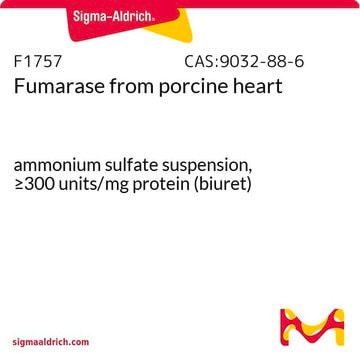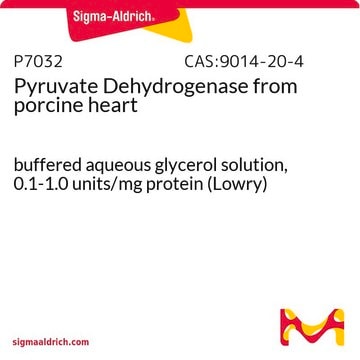K1502
α-Ketoglutarate Dehydrogenase from porcine heart
buffered aqueous glycerol solution, 0.1-1.0 units/mg protein (Lowry)
Synonyma:
Multienzyme 2-oxoglutarate dehydrogenase complex
About This Item
Doporučené produkty
form
buffered aqueous glycerol solution
specific activity
0.1-1.0 units/mg protein (Lowry)
foreign activity
pyruvate dehydrogenase ≤20%
shipped in
dry ice
storage temp.
−20°C
Hledáte podobné produkty? Navštivte Průvodce porovnáváním produktů
General description
α-Ketoglutarate dehydrogenase (α-KGDH) is a multienzyme complex localized to the mitochondria. This integrated enzyme is made up of many units of thiamine pyrophosphate-dependent dehydrogenase (E1), dihydrolipoamide dehydrogenase (E3), and dihydrolipoamide succinyl transferase (E2).
Application
- to study the reversal of nitration by glutathione (GSH) in peroxynitrite-treated cells
- to measure its activity by Spectramax M5 microplate spectrofluorimeter using heart mitochondria
- as a positive control to evaluate its activity in by Spectramax GEMINI EM fluorescence microplate reader using mice neurons
Biochem/physiol Actions
Quality
Unit Definition
Physical form
Legal Information
hcodes
pcodes
Hazard Classifications
Aquatic Chronic 3
Storage Class
10 - Combustible liquids
wgk_germany
WGK 1
flash_point_f
Not applicable
flash_point_c
Not applicable
ppe
Eyeshields, Gloves, multi-purpose combination respirator cartridge (US)
Osvědčení o analýze (COA)
Vyhledejte osvědčení Osvědčení o analýze (COA) zadáním čísla šarže/dávky těchto produktů. Čísla šarže a dávky lze nalézt na štítku produktu za slovy „Lot“ nebo „Batch“.
Již tento produkt vlastníte?
Dokumenty související s produkty, které jste v minulosti zakoupili, byly za účelem usnadnění shromážděny ve vaší Knihovně dokumentů.
Zákazníci si také prohlíželi
Náš tým vědeckých pracovníků má zkušenosti ve všech oblastech výzkumu, včetně přírodních věd, materiálových věd, chemické syntézy, chromatografie, analytiky a mnoha dalších..
Obraťte se na technický servis.











